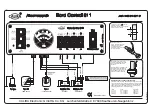
Chevrolet Silverado 4500HD/5500HD/6500HD Owner Manual (GMNA-
Localizing-U.S.-12102101) - 2019 - crc - 10/2/18
306
Vehicle Care
problem may not be too serious.
Sometimes the engine can get a
little too hot when the vehicle:
.
Climbs a long hill on a hot day.
.
Stops after high-speed driving.
.
Idles for long periods in traffic.
.
Tows a trailer. See
“
Driving on
Grades
”
under
Characteristics and Towing Tips
.
If the DIC message comes on with
no sign of steam, try this for a
minute or so:
1. In heavy traffic, let the engine
idle in N (Neutral) while
stopped. If it is safe to do so,
pull off the road, shift to
P (Park) or N (Neutral), and let
the engine idle.
2. Turn on the heater to full hot at
the highest fan speed and
open the window as necessary.
If the vehicle no longer has the
overheat warning, the vehicle can
be driven. Just to be safe, drive
slower for about 10 minutes. If the
warning does not come back on,
drive normally and have the cooling
system checked for proper fill and
function.
If the warning continues, pull over,
stop, and park the vehicle
right away.
If there is still no sign of steam and
the vehicle is equipped with an
engine driven cooling fan, push
down the accelerator until the
engine speed is about twice as fast
as normal idle speed for at least
five minutes while the vehicle is
parked. If the warning is still there,
turn off the engine and get everyone
out of the vehicle until it cools down.
The decision may be made not to tilt
the hood, but to get service help
right away.
Engine Fan
The vehicle has a clutched engine
cooling fan. When the clutch is
engaged, the fan spins faster to
provide more air to cool the engine.
In most everyday driving conditions,
the fan is spinning slower and the
clutch is not fully engaged. This
improves fuel economy and reduces
fan noise. Under heavy vehicle
loading, trailer towing, and/or high
outside temperatures, the fan speed
increases as the clutch more fully
engages, so an increase in fan
noise may be heard. This is normal
and should not be mistaken as the
transmission slipping or making
extra shifts. It is merely the cooling
system functioning properly. The fan
will slow down when additional
cooling is not required and the
clutch disengages.
This fan noise may also be heard
when starting the engine. It will go
away as the fan clutch partially
disengages.
Power Steering Fluid
See
for reservoir location.
When to Check Power Steering
Fluid
It is not necessary to regularly
check power steering fluid unless
there is a leak suspected in the
system or an unusual noise is
















































